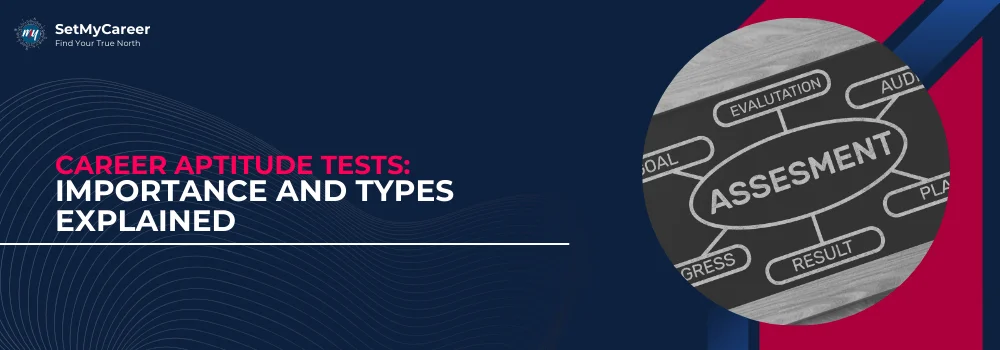Published by Jyothi Patil on 24 July 2023
Content Strategist | Editorial Team Member
Jyothi Patil is a skilled writer with a strong background in English literature, which she applies to crafting engaging content across various platforms. From writing blogs for her website and guest posts to creating pieces on Medium and Substack, Jyothi excels in making complex ideas easy to understand.
Did you know career aptitude tests can match you with careers suited to your skills? This article explores their types, importance, and the science behind them.

Career aptitude tests are standardized Career assessment test designed to evaluate an individual’s strengths, abilities, interests, personality traits, and aptitudes to guide them in making optimal Career Choices suited to their natural talents.
These psychometric career test provide clarity and direction by systematically analyzing capabilities and profiling personality to reveal suitable occupational paths that resonate with one's authentic self. For students exploring future careers or Working Professionals considering a career switch, Career aptitude test highlight new possibilities and opportunities for growth aligned with their innate potential.
This blog dives deeper into understanding what career aptitude tests are, their importance, types, and the science behind them. Read on!
Career aptitude tests are specialized career assessment test within the broader domain of psychometric tests for career counselling. Based on the theory that mental capabilities directly influence professional success, career aptitude tests aim to measure variabilities across individuals to determine suitability for specific career paths.
Using validated psychological instruments, these career assessment test evaluate quantitative, verbal, perceptual and reasoning abilities alongside interests, motivations, and personality traits.
The customized combination of attributes assessed indicates an individual’s aptitude — the natural ability to perform, understand concepts and acquire skills for a particular career. For example, careers in computer science align with strong mathematical logic and analytical reasoning abilities.
Through objective, standardized scoring devoid of human bias, career aptitude tests guide individuals towards occupations that leverage their innate talents for excellence while directing them away from unsuitable paths leading to dissatisfaction.

Stop guessing—find the career you’re naturally good at.
Take the TestMultidimensional insights derived from an integrated assessment approach provide the most accurate career guidance.
| Interest Inventories |
|
| Ability Tests |
|
| Values Scales |
|
| Personality Tests |
|
| Simulation-based Assessments |
|
Ultimately, integrating multiple career assessment test lenses empowers individuals to discover rewarding careers tailored to who they are at their core — matching personalities to specialist environments for engagement and excellence.
Modern career aptitude tests are built upon the scientific foundation of psychometrics — the field of study dedicated to objectively measuring psychological qualities using validated assessment instruments.
psychometric career test strive to quantify complex human attributes like abilities, attitudes and personality in a reliable, consistent and accurate manner through standardized testing conditions for valid comparisons across individuals over time.
Meticulously designed using principles from psychology and statistics, each test question and scoring norm is calibrated over thousands of test takers to screen out variability. Test blueprints balance key markers such as difficulty level, discriminating power, reproducibility of results and generalizability across demographic factors.
Predictive statistical modeling determines cut-off scores that objectively indicate the likelihood of success in target careers based on aptitude alignment.
Top scorers possess an innate propensity to understand underlying concepts, develop specialized skills, and thrive in associated career environments.
Through data-backed insights on competence potential for various careers, individuals discover possibilities aligned with their natural talents which subjective self-evaluation may not reveal.
At an organizational level, carefully validated career aptitude assessments minimize candidate screening costs and fulfill manpower requirements with significantly lower training overhead via contextualized ability and culture-fit testing.
Across industries, data-driven talent analytics using career aptitude test optimize business outcomes like employee productivity, satisfaction, growth and retention.
On an individual level, career assessment test unlock self-awareness regarding strengths suitable for nurturing and weaknesses to cultivate resilience. By matching your unique cognitive profile to real-world occupational demands, a scientific Career Test fosters informed decision-making by calculating statistical probabilities of potential career satisfaction and advancement relative to the individual. Eliminating guesswork, aptitude test career provides constructive feedback for setting achievable goals.
Career aptitude tests provide a time-tested scientific system for aligning talent to opportunities at scale for employers and career seekers alike.
Powered by psychometrics, these career assessment test unlock self-awareness regarding suitable paths that resonate with one’s authentic self — the seeds for blossoming careers and lives with purpose and meaning!
Though not destiny determiners, career aptitude tests remain indispensable guides in navigating the complex crossroads of career decisions. Your future may hold endless possibilities, but such tools illuminate the roads where you’re most likely to thrive based on who you are at the core.
No. 14/595, 1st Floor, Nanjappa Reddy Layout, Koramangala 8th Block, Bangalore 560095